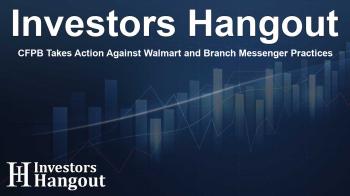CFPB Takes Action Against Walmart and Branch Messenger Practices

CFPB Sues Walmart and Branch Messenger
The Consumer Financial Protection Bureau (CFPB) has taken a significant step by initiating a lawsuit against Walmart and Branch Messenger, claiming they have engaged in questionable practices affecting delivery drivers. The allegations indicate that drivers were required to use specific deposit accounts for their pay, which could impose unnecessary financial burdens on them.
Details of the Lawsuit
According to CFPB's statements, the lawsuit points to Walmart's actions that forced delivery drivers to open costly deposit accounts under the Branch Messenger framework to receive their wages. This practice allegedly occurred without the drivers’ consent, raising concerns about transparency and fairness in their employment practices.
Understanding the Claims
The bureau emphasized that drivers may have felt pressured to accept these accounts due to the setup of delivery operations. They were reportedly not informed adequately about their options or the implications of using these accounts as a condition for receiving their earnings.
Implications for Workers
This situation has sparked broader conversations regarding worker rights and the responsibilities of large corporations in ensuring fair treatment. Companies like Walmart must consider how their policies can impact employees, especially those already in vulnerable financial positions.
Walmart and Branch Messenger Response
In response to these serious accusations, both Walmart and Branch Messenger have stated that they are committed to complying with consumer protection laws and are evaluating the claims made against them. As this legal battle unfolds, the implications for other companies may also be significant as they benchmark against best practices in employee compensation.
Broader Context of Employee Rights
This lawsuit is timely, given the increasing scrutiny over how large corporations manage their workforce’s financial well-being. As workers push for fairer treatment and equitable pay, regulatory bodies like the CFPB are stepping up to hold companies accountable for their actions.
The Future of Employment Practices
As discussions continue, it is essential for all employers to review their payment structures and account systems, ensuring they align with legal standards and ethical practices. This will not only protect their workers but also reinforce trust and loyalty within their workforce.
Frequently Asked Questions
What is the lawsuit about?
The CFPB is suing Walmart and Branch Messenger for allegedly forcing delivery drivers to open costly deposit accounts without consent.
What does this mean for delivery drivers?
If the allegations are proven true, this could highlight unfair practices that negatively impact drivers’ financial situations.
How are Walmart and Branch Messenger responding?
Both companies claim they are committed to complying with consumer protection laws and are reviewing the allegations.
Why is this lawsuit significant?
This case underscores the importance of fair treatment in employment, particularly in the gig economy.
What could happen next?
As the lawsuit progresses, it may prompt other companies to reassess their policies related to employee compensation and financial practices.
About Investors Hangout
Investors Hangout is a leading online stock forum for financial discussion and learning, offering a wide range of free tools and resources. It draws in traders of all levels, who exchange market knowledge, investigate trading tactics, and keep an eye on industry developments in real time. Featuring financial articles, stock message boards, quotes, charts, company profiles, and live news updates. Through cooperative learning and a wealth of informational resources, it helps users from novices creating their first portfolios to experts honing their techniques. Join Investors Hangout today: https://investorshangout.com/
Disclaimer: The content of this article is solely for general informational purposes only; it does not represent legal, financial, or investment advice. Investors Hangout does not offer financial advice; the author is not a licensed financial advisor. Consult a qualified advisor before making any financial or investment decisions based on this article. The author's interpretation of publicly available data shapes the opinions presented here; as a result, they should not be taken as advice to purchase, sell, or hold any securities mentioned or any other investments. The author does not guarantee the accuracy, completeness, or timeliness of any material, providing it "as is." Information and market conditions may change; past performance is not indicative of future outcomes. If any of the material offered here is inaccurate, please contact us for corrections.
